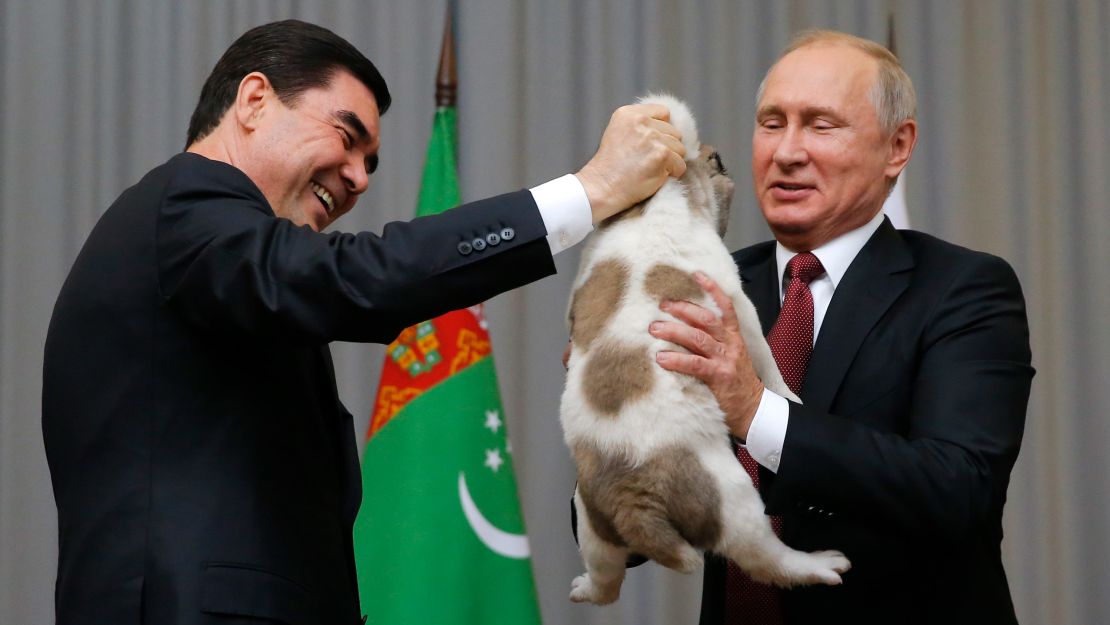Turkmenistan’s longtime leader has unveiled a giant gilded statue of a dog on a busy traffic circle in the capital Ashgabat.
Depicted standing proudly on a plinth, the gold-coated canine is an Alabai, a Turkmen-bred variety of the Central Asian shepherd dog and a symbol of national pride in the reclusive, authoritarian nation.
State TV Watan Habarlary showed President Gurbanguly Berdymukhamedov waving to clapping onlookers as he unveiled the statue this week, in a ceremony replete with traditional dancers, a child holding a real Alabai puppy, and a balloon release. A video screen wrapped around the statue continuously plays footage of the local breed running through grass or the desert and playing with children.
Along with horses, dogs are considered part of the country’s national heritage and are widely used by the many traditional herders among the population of six million. Berdymukhamedov, 63, has written a book and a poem about the Alabai dog and in 2017 gifted Russian President Vladimir Putin with a puppy for his birthday.
The large, stocky breed is known as “wolf crusher” for its prowess in guarding sheep and goats and is also used to guard homes.
The golden statue is the latest addition to Ashgabat’s growing collection of monuments, joining a gold-coated statue of President Berdymukhamedov himself seated on a horse mounted on a white marble cliff, built at another major junction in 2015.
Berdymukhamedov has held tight control of the country since the 2006 death of his equally authoritarian predecessor Saparmurat Niyazov.
In the years since, the President has embarked on a building spree that transformed the sleepy capital into a showcase of golden domes, giant statues and white marble buildings. The city holds the Guinness World Record for the highest density of white marble-clad buildings anywhere in the world, and Berdymukhamedov’s portrait hangs from many of them.
Other projects include a $2.3 billion airport shaped like a bird and a $5 billion so-called “Olympic village” for the 2017 Asian Indoor and Martial Arts Games, according to British think tank, The Foreign Policy Centre.
Despite the glitzy capital and billions of dollars spent on architectural curiosities, Turkmenistan’s population faces hyper inflation and food shortages.
A 2019 report by The Foreign Policy Centre, suggests Turkmenistan’s economy – which relies on the country’s vast reserves of gas – is in the grip of its worst economic crisis and on the “brink of collapse,” driven in part by low gas prices and falling natural gas exports.

The government’s inaction to respond to the economic fallout from the coronavirus pandemic has also exacerbated the country’s already dire food crisis, which has been compounded by poor harvests and shortages of subsidized food, according to a September report from Human Rights Watch and the Turkmenistan Initiative for Human Rights.
Local people interviewed by the rights group reported waiting for hours in lines for subsidized food, of which up to 70 to 80% of their income goes toward, as prices skyrocket. Adding to their economic woes is that the pandemic has put many Turkmen out of work and slashed foreign remittance money to families, according to HRW. Authorities have never released unemployment figures but the FPC estimates that up to 60 to 70% of the eligible workforce is either unemployed or underemployed.
But HRW said the Turkmenistan government denies the existence of poverty in the country and has failed to provide relief to communities struggling economically.
“Turkmenistan’s government has prioritized the country’s image over people’s well-being,” said Rachel Denber, deputy Europe and Central Asia director at Human Rights Watch, in a statement. “With no effort to identify and assist the people most in need at this critical moment, Turkmenistan is callously neglecting the most basic norms of human rights, which include the right to food.”
Previously, the Turkmen Foreign Ministry did not respond to CNN requests for comment regarding allegations that the government is responsible for human rights abuses. CNN has reached out to the Turkmen Foreign Ministry for further comment.
Turkmenistan has officially reported no cases of Covid-19 – one of very few countries in the world not to.
The US Embassy in Turkmenistan, however, said on its website the country “may be disinclined to do so if cases were confirmed” and that it has received reports “of local citizens with symptoms consistent with Covid-19 undergoing Covid-19 testing and being placed in quarantine in infectious diseases hospitals.”
Information coming out of the former Soviet republic – labeled by HRW as one of the world’s most repressive – is strictly controlled. There is no independent media and most foreign websites are blocked, according to the independent watchdog group Freedom House.
Human rights abuses are commonplace, activists often disappear, and forced labor is a concern, according to HRW. Foreign media outlets have little access to Turkmenistan; religious and political expression are “brutally punished” by the government; torture is rife in the country’s prisons, and no independent monitoring groups are allowed in the country, HRW said.
Its record has seen Turkmenistan hit the bottom of a number of human rights indexes, including the World Press Freedom Index and Transparency International’s Corruption Perceptions Index.
CNN’s Thomas Page and Julie Zaugg contributed reporting.



